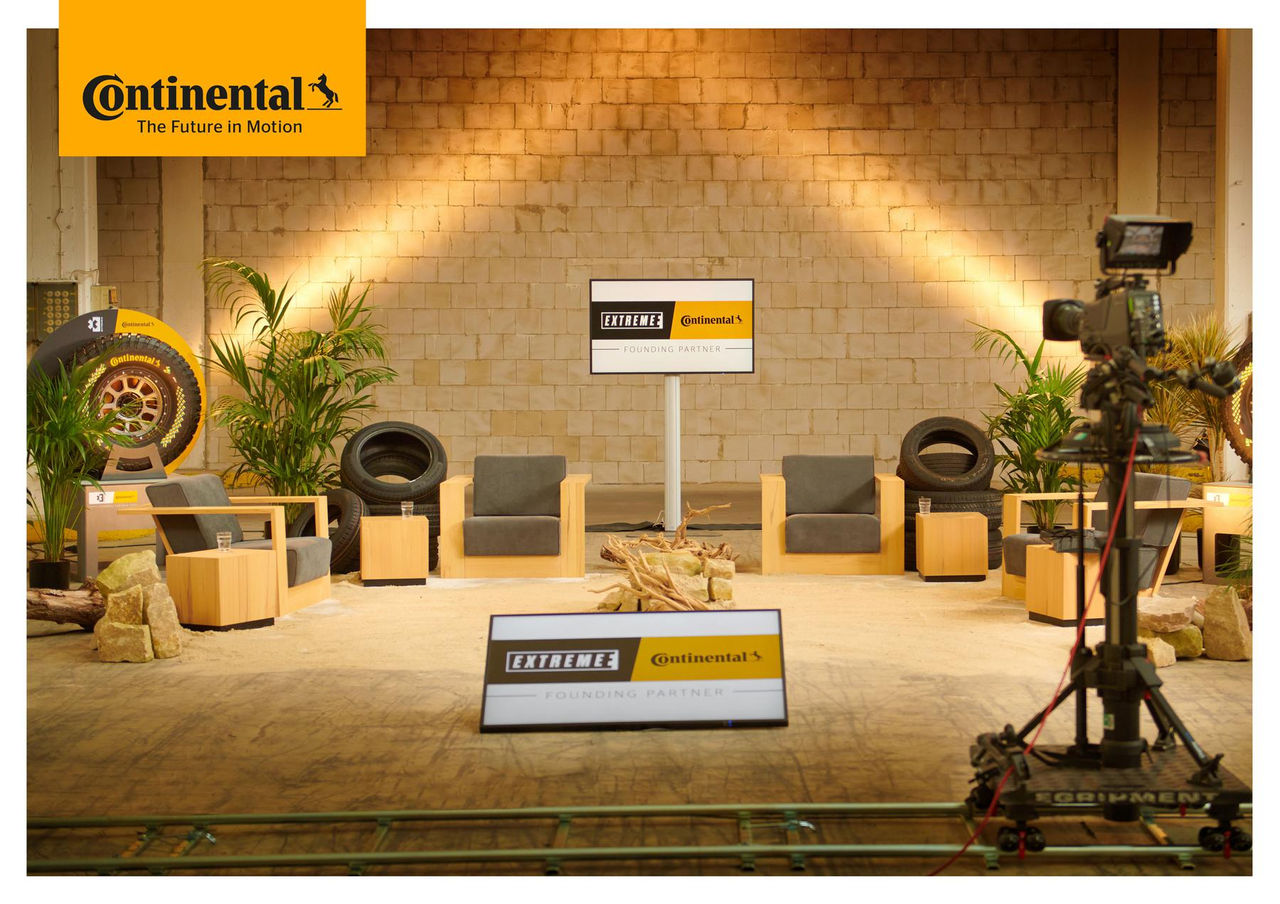Continental Provides Overview of Sustainability Commitment and Extreme E
- Tyre manufacturer uses Extreme E to encourage more people to act sustainably
- Consistent research and development of new technologies, alternative materials and environmentally friendly production processes in the tyre sector
- 100 percent sustainable materials in tyre production and climate-neutral supply chain by 2050 at the latest
HANOVER, Germany, 16 September 2021 – At a digital event in the run-up to the recent Extreme E race in Greenland, Continental gave an overview of its commitment to the Extreme E series as well as the current sustainability projects of the Tires business area.
"We have been investing in research and development for many years to drive innovative technologies, alternative and sustainable materials, and environmentally friendly production processes," says Philipp von Hirschheydt, Head of Business Unit Replacement Tires at Continental. "Our cooperation with Extreme E is additionally an integral part of our strategy to roll out the priority of sustainability to new target groups."
In the sustainability sector, Continental is pursuing ambitious goals and aiming to become the most progressive manufacturer in the tyre industry by 2030. Efforts here are centred around the strategic topics of climate action, low-emission mobility, the circular economy and sustainable supply chains, thus embracing all phases of the value chain.
1. Extreme E – Technological innovation and sustainability
Continental is a founding partner and premium sponsor of the Extreme E all-electric racing series.
Through its commitment, Continental, together with Extreme E, would like to draw attention to the challenges of climate change occurring worldwide: “For a global company like Continental, it is not just a matter of taking our own measures. We also want to make a contribution to drawing society's attention to the challenges we are facing,” says von Hirschheydt.
Through the partnership, the company also demonstrates its technological capabilities in racing. The vehicle is a 1.78-ton electric-powered racing SUV with 550 hp (approximately 410 kW). "In developing the tyre, we overcame three major challenges: in addition to the very tight development schedule, the weight is high compared to other racing vehicles,” explains Catarina Silva, Team Lead Product Management Summer, 4x4 and Van Products at Continental Tires. “At the same time, the torque is very strong, as is usual with electric drives. The combination of these two factors puts an enormous strain on the tyres."
After thorough testing, Continental's developers chose the CrossContact off-road tyre as the basis and adapted the design to meet the challenges of Extreme E. Since the tyre has to deliver the same performance on all surfaces under any weather conditions, the developers extensively tested the CrossContact Extreme E on various test tracks and different surfaces. "The development period was very tight. However, we managed to handle many processes in parallel that would otherwise run classically one after the other. The entire development process was a great experience for the whole team," says Silva.
2. “Vision 2030” – Continuing the success story through sustainable action
Continental set out its new strategic program for the Tires business area at the end of 2020, called “Vision 2030”, which is focused on the systematic customer-centric alignment of the organization and all its business activities. In addition, the Tires business area is targeting further profitable growth and, in a fast-changing market environment, aiming to set itself apart from the competition in respect of sustainability.
With this in mind, back in April 2020, all the relevant projects and activities worldwide were brought under the umbrella of the newly created Sustainability department.
In order to arrive at a more energy-efficient and environmentally friendly tyre of the future in respect of production, use and recyclability, Continental systematically invests in research and development in the fields of new technologies, alternative materials and environmentally compatible production processes. Through these efforts, by 2050 the tyre manufacturer is aiming to gradually transition to 100 percent sustainably produced materials in its tyre products.
The Tires business area is already the industry leader in the efficient and sustainable use of water and energy. As a result of years of hard work, today Continental already consumes 55 percent less water and 17 percent less energy than the industry average per metric ton of tyres produced. By 2030, the aim is to achieve savings of an additional 20 percent in each case.
3. Taraxagum – Russian dandelion as an alternative source of natural rubber
One of Continental's key concerns is to stop importing natural rubber exclusively from the tropics in the future and to extract it as close as possible to its tyre plants in order to prevent ongoing deforestation and reduce the CO2 emissions caused by long transport routes.
The industrialization of the cultivation of dandelion rubber is the goal of the long-term Taraxagum project of Continental and the Fraunhofer Institute for Molecular Biology and Applied Ecology (IME). Taraxagum should in future be used for a wide range of other products, such as car and truck tyres, agricultural tyres and technical rubber goods. In addition to the IME, the project is embedded in a network with other key partners such as the Julius Kühn Institute and the plant breeder ESKUSA.
The realistic yield target is to obtain one ton of rubber per hectare of cultivated land. That would be roughly equivalent to the yield of one hectare planted with classic rubber trees. This would enable Continental to secure a growing proportion of its natural rubber requirements from a new, sustainable source.
The Urban Taraxagum bicycle tyre, available on the market since 2019 and produced at Continental’s tyre plant in Korbach, Germany, is the first serial product made of dandelion rubber that combines local production with minimal transport distances in the supply chain. It was developed especially for the sustainable lifestyle.
4. Cokoon – Environmentally friendly bonding system for textile reinforcements materials
Continental and Kordsa have together developed a new sustainable adhesive technology standard for bonding textile reinforcing materials with rubber compounds. Reinforcing materials of this kind are used in the tyre industry, as well as in the production of mechanical rubber goods like hoses and conveyor belts. The new technology enables the bonding activation of textile reinforcing materials without the use of resorcinol and formaldehyde.
The two development partners are offering the new bonding system technology to all other tyre manufacturers and the supplier industry as an open-source solution under the brand name ‘Cokoon’. Continental and Kordsa have chosen to waive development or licensing fees. In return, they expect licensees to make their patents concerning the further enhancement of this technology available to the other partners free of charge via a licensing pool. Continental has been using the new sustainable adhesion technology in series production since 2019.
5. Sustainable supply chain – Responsible sourcing of natural rubber
Continental is actively promoting greater sustainability in the extraction of natural rubber through various strategic projects. The premium tyre manufacturer is pursuing the goals of creating better working conditions for smallholders, protecting existing rainforest areas, and ensuring greater transparency and knowledge in the natural rubber sector through digital systems.
As a founding member of the Global Platform for Sustainable Natural Rubber (GPSNR), Continental is actively promoting solutions for improved traceability together with partners. The company is also involved in a wide range of projects. These include the Rubberway joint venture, which specializes in identifying sustainability risks in the natural rubber supply chain, and the cooperation with the Gesellschaft für Internationale Zusammenarbeit (GIZ), in which Continental is contributing to a project to train smallholders and introduce digital traceability systems throughout the supply chain.
6. Recycled PET bottles in tyre production
Continental enables the use of reprocessed polyester obtained from recycled plastic bottles in its tyre production as of 2022. The new sustainable polyester yarn will be obtained from polyethylene terephthalate (PET) bottles by a mechanical process and will be used in the construction of the tyre carcass. This can completely replace conventional polyester.
Together with its cooperation partner and supplier OTIZ, a fibre specialist and textile manufacturer, the premium tyre manufacturer has developed a special technology to recycle PET bottles without previously necessary intermediate chemical steps and to make the polyester yarn functional for the high mechanical requirements of the tyre. In the course of so-called upcycling, a PET bottle becomes a high-performance PET material.
Conventional PET has long been used as a material in car tyre construction because it retains its shape even under high loads and temperatures and thus ensures safety at all driving speeds. The use of recycled PET conserves valuable resources in tyre construction: today, a conventional passenger car tyre consists of around 400 grams of polyester yarn. This means that more than 60 recycled PET bottles can be used for a complete set of vehicle tyres in the future.
7. Diversity – More female managers and work-life balance
Continental aims to increase the proportion of women in the first two management levels worldwide. In 2020, the proportion of female managers at Continental was over 16 percent. Continental aims to increase this figure to 25 percent by 2025. By initiating numerous projects and programs, the technology company raises the profile of its talented female employees and supports global networking among them. This includes a global diversity network as well as events such as Women@Work and an annual diversity summit. Continental also offers the necessary working conditions to allow female employees to combine family and career.
The company promotes part-time work and flexible work arrangements. Back in 2016, it introduced a series of options such as working from home, mobile working and sabbaticals for all employees worldwide, well before the Corona (COVID-19) crisis.
"Companies not only have to survive in an increasingly complex business world, they also have to serve the needs of a diverse clientele. That can only be done with the best employees, regardless of origin or gender," says Philipp von Hirschheydt. "Here, too, I see the connection to Extreme E. The individual teams are required to start with a balanced gender ratio. This is also Continental's goal in all our projects."
ENDS
Press contact
South Africa:
Jiminy Bosman
PR and Communications Manager
BU Replacement EMEA
Continental Tyre SA (Pty) Ltd
Phone: +27 41 406 5640
Email: Jiminyann.bosman@conti.co.za
Links

